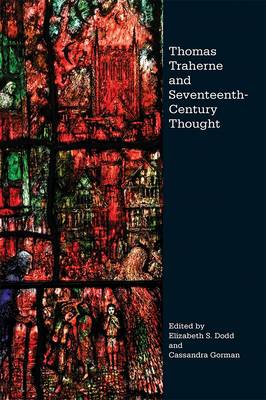
Bedankt voor het vertrouwen het afgelopen jaar! Om jou te bedanken bieden we GRATIS verzending (in België) aan op alles gedurende de hele maand januari.
- Afhalen na 1 uur in een winkel met voorraad
- In januari gratis thuislevering in België
- Ruim aanbod met 7 miljoen producten
Bedankt voor het vertrouwen het afgelopen jaar! Om jou te bedanken bieden we GRATIS verzending (in België) aan op alles gedurende de hele maand januari.
- Afhalen na 1 uur in een winkel met voorraad
- In januari gratis thuislevering in België
- Ruim aanbod met 7 miljoen producten
Zoeken
Thomas Traherne and Seventeenth-Century Thought
€ 177,45
+ 354 punten
Omschrijving
Thomas Traherne has all too often been defined and studied as a solitary thinker, "out of his time," and not as a participant in the complex intellectual currents of the period. The essays collected here take issue with this reading, placing Traherne firmly in his historical context and situating his work within broader issues in seventeenth-century studies and the history of ideas. They draw on recently published textual discoveries alongside manuscripts which will soon be published for the first time. They address major themes in Traherne studies, including Traherne's understanding of matter and spirit, his attitude towards happiness and holiness, his response to solitude and society, and his Anglican identity. As a whole, the volume aims to re-ignite discussion on settled readings of Traherne's work, to reconsider issues in Traherne scholarship which have long lain dormant, and to supplement our picture of the man and his writings through new discoveries and insights. Elizabeth S. Dodd is programme leader for the MA in theology, ministry and mission and lecturer in theology, imagination and culture at Sarum College, Salisbury; Cassandra Gorman is lecturer in English at Trinity College, Cambridge. Contributors: Jacob Blevins, Warren Chernaik, Phoebe Dickerson, Elizabeth S. Dodd, Ana Elena Gonzalez-Trevino, Cassandra Gorman, Carol Ann Johnston, Alison Kershaw, Kathryn Murphy
Specificaties
Betrokkenen
- Uitgeverij:
Inhoud
- Aantal bladzijden:
- 244
- Taal:
- Engels
- Reeks:
- Reeksnummer:
- nr. 33
Eigenschappen
- Productcode (EAN):
- 9781843844242
- Verschijningsdatum:
- 21/06/2016
- Uitvoering:
- Hardcover
- Formaat:
- Genaaid
- Afmetingen:
- 156 mm x 234 mm
- Gewicht:
- 517 g

Alleen bij Standaard Boekhandel
+ 354 punten op je klantenkaart van Standaard Boekhandel
Beoordelingen
We publiceren alleen reviews die voldoen aan de voorwaarden voor reviews. Bekijk onze voorwaarden voor reviews.








